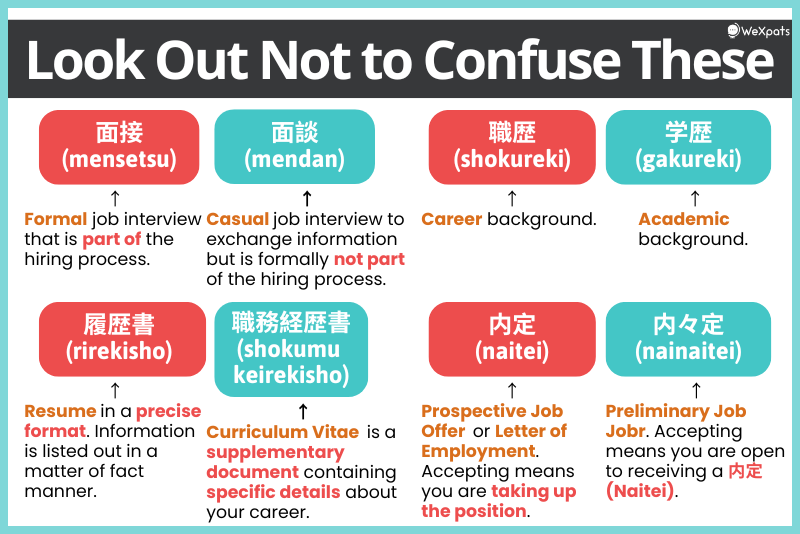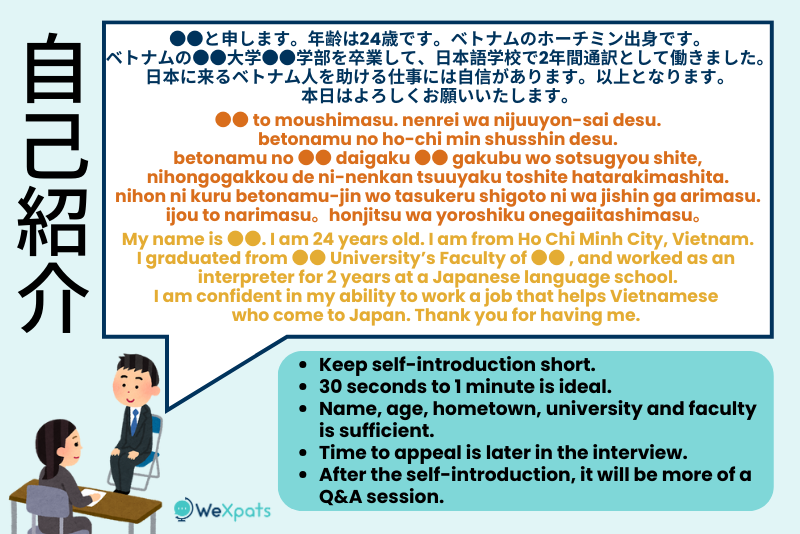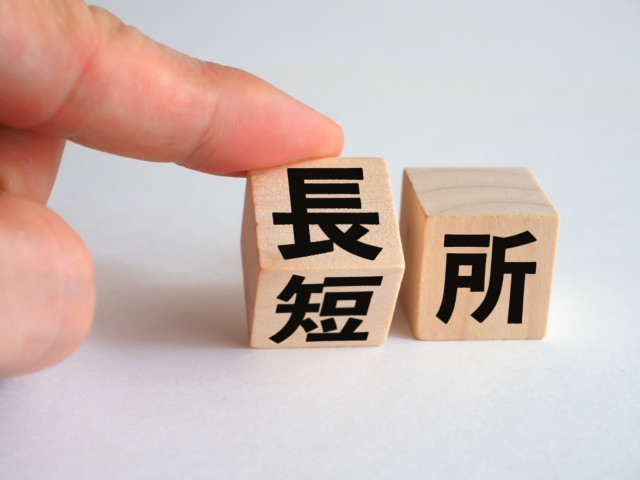Job interviews can sometimes be the deciding factor to landing a job. What are job interviews in Japan like? What do interviewers expect from candidates? How to give good interview answers? In this article, we help guide you through the interview process.
First Published: 2023-03-03
Updated: 2024-06-11
Table of Content
- Basic Understanding of Japanese Interviews
- How to Prepare For a Job Interview in Japan
- How to Introduce Yourself in Japanese Interview
- Example Japanese Interview Questions and Answers
- Find a Job in Japan with WeXpats
 Are you having any issues with job-hunting in Japan?
Are you having any issues with job-hunting in Japan?
Basic Understanding of Japanese Interviews

A job interview is an essential, unavoidable step to getting a job in Japan. When does the job interview stage come in?
The general job hunting flow in Japan for fresh graduates is to attend company information sessions → job application & screening (entry sheet, resume, CV) → written test / aptitude test → job interview → job offer. Note that multiple interviews may be required depending on the company.
Finding a job in Japan as a fresh graduate international student? Our in-depth Guide to Job Hunting in Japan for Fresh Graduates and International Students will come in handy.
Japanese interviews are pretty standard, always starting with a self-introduction by the candidate. This is followed by personal questions about the candidate such as strengths and weaknesses, and why Japan. Thereafter, delving into education and career background, and finally ending with questions about why the candidate chose the company, working conditions, and ambitions at the company. Candidates will also get the opportunity to ask questions about the company and the position. It is not recommended to skip this, even if you do not have any questions, as it will show lack of interest.
How to Address the Hiring Company during a Job Interview - 御社 (onsha) ? 貴社 (kisha) ?
There are 2 main Japanese words to show respect to the company you are addressing; 御社 (onsha) and 貴社 (kisha). How should these 2 words be used?
御社 (onsha) is considered as 敬語 (keigo / honourific language) in verbal communication, and is used when speaking to the people of the company. In other words, you can't go wrong with using 御社 (onsha) in a job interview.
On the other hand, 貴社 (kisha) is considered as Keigo (honourific language) used in written communication. Therefore, 貴社 (kisha) is used in documents that are submitted to companies, for example your resume, entry sheet, and emails.
Useful Japanese Terms to Know for Job Interviews

These are some Japanese terms that are important to know when preparing for job
-
面接 mensetsu : interview (part of the hiring process, formal interview)
-
面談 mendan : interview (a casual talk to exchange information, not part of the hiring process)
-
履歴書 rirekisho : resume
-
職務経歴書 shokumu keirekisho : curriculum vitae
-
職歴 shokureki : career background / employment history
-
学歴 gakureki : academic background / education history
-
内定 naitei : prospective job offer

These are some Japanese terms that are highly likely to be mentioned during an interview.
-
長所 chousho / 強み tsuyomi / 得意なこと tokui na koto : strengths
-
短所 tansho / 弱み yowami / 苦手なこと nigate na koto: weaknesses
-
趣味 shumi : hobby / interests
-
性格 seikaku : personality
-
個性 kosei : personality / individuality / character
-
実績 jisseki : achievements
-
経験 keiken : experience
-
体験 taiken : personal experience
-
希望 kibou : aspiration
-
質問 shitsumon : question
-
自己紹介 jiko shoukai : self-introduction
-
応募動機 oubodouki : reason for application
-
志望動機 shiboudoki : reason for application / motivations
-
勤務条件 kinmu jouken : working conditions
-
在留資格 zairyuu shikaku : status of residence
-
在留期間 zairyuu kikan : period of stay in Japan
-
~教えてください。~oshiete kudasai : Please tell me…
Writer's Pick
How to Prepare for a Job Interview in Japan

First things first, in many cases, applying to work in Japan requires around business level Japanese (JLPT N2 recommended), especially if you are working in a Japanese company. So, unless your Japanese proficiency is at a certain level, you may find it difficult to pass a Japanese interview. There are many ways you can do this, learning the basics of Japanese interviews and preparing for frequently asked questions is a good starting point.
What other ways can you prepare yourself? Read on to find out.
Finish Preparing the Day Before
Just as it says, finishing preparations the day before gives you ample time to get ready before setting off. Ensure that you have prepared the following :
Things to Bring for Job Interview
-
Copies of resume and CV
-
Resident’s Card
-
Wallet
-
Mobile Phone, Charger, Portable Battery
-
Memo Pad, Stationery
※ Check the weather forecast in case you need umbrella.
What to Wear to Job Interview
Strictly formal wear, applicants both men and women, are expected to wear suits. Men are required to wear a solid-coloured tie. Women may wear skirts that cover down to the knees, and stockings should be skin coloured. Both men and women should have neatly groomed hair, long hair should be tied up neatly.
In addition, hair colour should be natural and nails neatly groomed with no nail polish or natural looking nail polish. Perfume and cologne should be avoided. If using makeup, keep it natural and simple.
Learn the Proper Manners
-
Being Punctual : Be at the interview site 15 minutes before the scheduled time. Check yourself once over before entering the building.
-
Full Attention to the Interviewer : Silence or switch off your mobile phone to avoid interruptions and distractions. It is also a sign of respect to the interviewer.
-
Right Way of Entering and Leaving the Room : Knock the door 3 times, when asked to enter, enter while saying “Shitsureshimasu (失礼します / excuse me)”. Bow to the interviewers once, introduce yourself shortly, and sit down saying “Shitsureshimasu” again. When the interview is over, say your thank yous, bow once, say “Shitsureshimasu” and leave the room.
-
Use Polite Speech : If you are fluent in Japanese, then Keigo (敬語 honorific speech) is recommended. But if not, make sure to end all sentences with -masu / -desu and avoid using slang speech.
-
Proper Posture When Seated : Do not cross your legs, keep both feet planted flat on the ground. Ideally, sith with your knees together and hands placed on thighs or knees.
-
Use Both Hands When Handing and Receiving Things : When passing your resume, or any other document, to the interviewers, always use both hands. Also use both hands when receiving anything from interviewers.
If you’re up for a challenge, the following phrases are commonly said at the end of Japanese interviews.
本日は貴重なお時間をいただき、ありがとうございました。
Honjitsu wa kichou na ojikan wo itadaki, arigatou gozaimashita.
- Thank you for taking your precious time to interview me today.
何卒よろしくお願いいたします。
Nanisotsu yoroshiku onegai itashimasu.
- (Literal translation) I continue to be in your favour during this process.
- (The equivalent of) Thank you so much and I look forward to hearing from you.
Prepare Your Answers in Advance
Interview practice sessions are recommended to get you familiarised before the big day. Practise your self-introduction as well as answering frequently asked questions at interviews so you know what to expect.
How to Introduce Yourself in Japanese Interview

The self-introduction (自己紹介) is often the first question asked in an interview. It is also an opportunity for the interviewer to gauge your Japanese ability. You don’t have to speak fast, just clearly. The interviewer will ask you to introduce yourself by saying 「自己紹介をしてください 」- “jiko shoukai wo shite kudasai (please introduce yourself)”.
【Sample Answer】
●●●●●●と申します。年齢は24歳です。ベトナムのホーチミン出身です。
ベトナムの●●大学●●学部を卒業して、日本語学校で2年間通訳として働きました。
日本に来るベトナム人を助ける仕事には自信があります。以上となります。
本日はよろしくお願いいたします。
●●●●●● to moushimasu。 nenrei wa nijuuyon-sai desu。betonamu no ho-chi min shusshin desu。
betonamu no ●● daigaku ●● gakubu wo sotsugyou shite、nihongogakkou de ni-nenkan tsuuyaku toshite hatarakimashita。
nihon ni kuru betonamu-jin wo tasukeru shigoto ni wa jishin ga arimasu。ijou to narimasu。
honjitsu wa yoroshiku onegaiitashimasu。
- My name is ●●●●●●. I am 24 years old. I am from Ho Chi Minh City, Vietnam.
I graduated from ●● University’s Faculty of ●● , and worked as an interpreter for 2 years at a Japanese language school.
I am confident in my ability to work a job that helps Vietnamese who come to Japan. That is all.
I look forward to [this interview] today.
The self-introduction is not the right time to appeal to the interviewer, so keep it short to 30 seconds to 1 minute. A brief introduction of yourself such as your name, age, hometown, graduated university and department, what you most recently did is sufficient.
After this part is over with, the rest of the interview will be more of a Q&A session with the interviewer asking you questions and you answering them. If you would like the interviewer to repeat the question, politely ask:
「すみません、もう一度お願いします。」
Sumimasen, mou ichido onegaishimasu.
- Pardon me, one more time please.
Example Japanese Interview Questions and Answers

Here are some other example Japanese interview questions and answers for reference to help you prepare for a Japanese interview.
Tell me/us about your strengths and weaknesses.
「長所と短所を教えてください。」
choushou to tansho wo oshiete kudasai.
【Sample Answer】
私の長所は忍耐力があるところです。
日本に来たばかりのときは、文化の違いに驚いて受け入れられなかったこともありました。
しかし、日本の友達やインターネットなどを参考に日本の習慣を少しずつ学んできました。
難しい課題にも自力で解決しようと努力できることが自慢です。
Watashi no choushou wa nintairyoku ga aru koto desu。
nihon ni kita bakari no toki wa, bunka no chigai ni odoroite ukeirerarenakatta koto mo arimashita。
shikashi, nihon no tomodachi ya intaanetto nado wo sankou ni nihon no shuukan wo sukoshizutsu manandekimashita。
muzukashii kadai nimo jiriki de kaiketsushiyou to doryoku dekiru koto ga jiman desu。
- My strong point is that I have perseverance.
When I first came to Japan, I was surprised at the cultural differences and had a hard time accepting them.
However, I learnt Japanese customs bit by bit with the help of my Japanese friends and the internet.
I am also proud of my ability to solve difficult problems on my own.
短所は少々プライドが高いところです。
自分が正しいと思ったら意見をはっきり言うことが多いです。
しかし、日本に来てから、お互いに『すみません』と言い合う気遣いを学びました。
今では、まず自分から謝ることを心掛けています。
Tansho wa shoushou puraido ga takai tokoro desu。
jibun ga tadashii to omottara iken wo hakkiri iiu koto ga ooi desu。
shikashi, nihon ni kitekara, otagai ni “sumimasen” to iiau kizukai wo manabimashita.
ima dewa, mazu jibun kara ayamaru koto wo kokoro kaketeimasu。
- My weakness is that I am a bit prideful.
I often clearly express my thoughts when I think I am right.
However, since coming to Japan, I have learnt the consideration of exchanging “I’m sorry” with others.
Now, I bear in mind to apologise first.
Keep in mind that saying that you have no strengths or weaknesses, or you do not know them, does not reflect well upon you.
Tell me/us about your accomplishments and successes at work.
「仕事の実績や成功体験を教えてください」
shigoto no jisseki ya seikou taiken wo oshietekudasai.
【Sample Answer】
日本に住むベトナム人に多い悩みと役立つ知識をまとめた資料を作り、社内で共有しました。
社内でベトナム人社員は私1人だったのですが、その結果、日本人社員もベトナム人学生の悩み相談に乗れるようになりました。
Nihon ni sumu betonamu-jin ni ooi nayami to yakutatsu chishiki wo matometa shiryou wo tsukuri, shanai de kyouyuu shimashita。
shanai dewa betonamu-jin shain wa watakushi hitori dattano desuga, sono kekka, nihon-jin shaiin mo betonamu-jin gakusei no nayami soudan ni noreruyou ni narimashita。
- I created a document that summarises the most common problems faced by Vietnamese living in Japan and useful knowledge, and shared it within the company.
I was the only Vietnamese employee in the company, as a result, Japanese employees were also able to support Vietnamese students with their problems.
Appeal by citing specifics, such as an actual episode or experience in which you received an award in the company, a successful project you participated in, or an achievement that increased sales.
What do you want to do after joining the company?
「入社したら何をしたいですか?」
nyuusha shitara nani wo shitai desuka ?
【Sample Answer】
ベトナム人と日本人との橋渡しができる業務を行いたいです。
これまで私は、日本で生活するベトナム人のサポートを行ってきました。
入社後は、ベトナム人がどのようなことに悩み、そしてベトナム人と関わる日本人がどのような問題を抱えているを把握し、
両者にとって最善の対応ができるようになりたいと考えています。
Betonamu-jin to nihon-ji to no hashiwatashi ga dekiru gyoumu wo okonaitai desu。
Kore made watakushi wa, nihon de no seikatsu suru betonamu-jin no sapooto wo okonattekimashita。
nyuusha ato wa, betonamu-jin ga dono youna koto ni nayami, soshite betonamu-jin to kakawaru nihon-jin ga dono youna mondai wo kakaeteiru wo haaku shi,
ryosha nitotte saizen no taiou ga dekiru youni naritai to kangaeteimasu。
- I would like to work as a bridge between Vietnamese and Japanese.
So far, I have supported Vietnamese people living in Japan. After joining the company,
I would like to come to understand what problems Vietnamese people have and what problems Japanese people who are involved with Vietnamese people have,
and be able to respond in the best way for both parties.
When answering this question, a good idea is to talk about your past experience that fits the job description. Another good appeal point is that it is a job that only you, as a foreign national, can do after joining the company.
Find a Job in Japan with WeXpats

Attempting a Japanese interview can be difficult and stressful the first few times, but as many things does, it gets easier with practice and perseverance. Being well-prepared is also a huge help. Equip yourself with the knowledge of Japanese interviews, pre-prepare your answers to common interview questions, just keep on practising and eventually you will make it. If you need help practising job interviews, there are recruitment agencies that offer such help. One of them is WeXpats.

WeXpats operates a service for foreign nationals who want to work in Japan. There are jobs in a variety of industries including the medical field. There are 2 services available on WeXpats - WeXpats Agent for full time jobs and WeXpats Jobs for part time jobs.
Looking for a Full Time Position? Leave it to WeXpats Agent!
WeXpats Agent is a career support service that specialises in employment for foreign nationals living in Japan.
Recruitment agencies in Japan are a service where dedicated career advisors will assist you with your job hunt for free. In addition to introducing open positions, we also provide support to help you create your Japanese resume and practice for interviews. Worried about job hunting in Japanese? We are here for you.
Features of WeXpats Agent
-
We have many job openings that are a good fit for foreign nationals to work in, such as translation, interpretation, inbound, etc. jobs that make use of your language skills, as well as engineering etc. jobs that do not require Japanese skills.
-
Our career advisors support and help you prepare your resume and practice job interviews with you. Clearly communicate your strengths to the hiring company.
-
We will handle communication with companies on your behalf, such as arranging interview dates and negotiating conditions. And thereby reducing your stress and time spent.
Finding a Part Time Job? Browse on WeXpats Jobs!

WeXpats Jobs is a part time job site for foreign nationals living in Japan. You can search for jobs in 11 languages (English, Vietnamese, Korean, Indonesian, Traditional Chinese, Simplified Chinese, Burmese, Thai, Spanish, Portuguese), including Japanese. Find jobs that suit you by specifying your Japanese language level, occupation, location, and etc.
※ You can register from outside Japan, but only those living in Japan can apply for jobs.




































